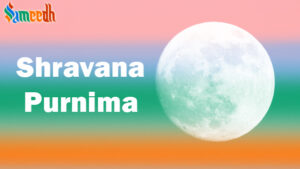Shravana Purnima is a significant Hindu festival celebrated in the month of Shravana (July-August) according to the Hindu lunar calendar. Purnima refers to the full moon day. This festival holds special importance in Hindu culture and is celebrated with various rituals and customs across different regions of India.

“Purnima” (Puranmashi) is a Sanskrit term meaning “fullmoon.” In Hinduism and several other Indian religions and cultures, Purnima holds significant spiritual and religious significance. It occurs on the fifteenth day (Purnima Tithi) of the lunar month in the Hindu calendar, typically every month. Shravana Purnima is one of the twelve Purnima or Pooranmashi occurring in a year.
Shravana Purnima is the full moon day of the month of Shravana. This day has a number of different names. Hayagriva Jayanti and Gayatri Jayanti are also celebrated on Shravana Purnima. It also marks the occasion of Raksha Bandhan. The month of Shravana is very important for the entire Indian subcontinent, as it is connected to the arrival of the south-west monsoons. For many Hindus, the month of Shravana is a month of fasting.
Shravana Purnima, the full moon day in the month of Shravana (July-August) according to the Hindu lunar calendar, is associated with several mythological events in Hinduism:
- Raksha Bandhan and the Legend of Indra and Sachi: Another mythological story associated with Shravana Purnima is the legend of Lord Indra and his wife Sachi. According to this tale, during a battle between gods and demons, Lord Indra, the king of gods, was facing defeat. Sachi, his wife, sought help from Lord Vishnu, who gave her a protective thread (raksha) to tie around Indra’s wrist. Sachi tied the thread on Shravana Purnima, and it is believed that the thread protected Indra and ensured his victory. This legend is often cited as the origin of the tradition of Raksha Bandhan, where sisters tie rakhi (sacred threads) around the wrists of their brothers for protection and blessings.
- Lord Shiva’s Consumption of Poison: One significant mythological event associated with Shravana Purnima is the episode of Lord Shiv drinking the poison during the churning of the ocean (Samudra Manthan). According to Hindu mythology, when the gods (devas) and demons (asuras) churned the ocean to obtain the nectar of immortality (amrita), a deadly poison (halahala) emerged first. To prevent the poison from harming the universe, Lord Shiv consumed it. This event is believed to have taken place on Shravana Purnima. As a result, Shravana Purnima is sometimes referred to as “Jhulan Purnima” or “Jhulan Yatra,” where devotees reenact the swinging pastimes of Lord Krushna and Radha, symbolizing the swings used to calm Lord Shiv after he drank the poison.
These mythological events highlight the significance of Shravana Purnima in Hindu culture and spirituality. They are often recounted and celebrated during the festival to honor the divine and reinforce the values of protection, courage, and devotion.
Shravana Purnima is considered highly auspicious in Hinduism. Devotees observe religious rituals, offer prayers, and visit temples on this day to seek blessings from the deities. It is believed that performing spiritual activities on Shravana Purnima brings spiritual growth, prosperity, and divine grace.
In agrarian societies, Shravana Purnima marks the beginning of the harvest season. Farmers offer prayers and perform rituals to express gratitude for the abundance of nature and seek blessings for a bountiful harvest.
Shravana Purnima is celebrated with cultural fervor across different regions of India. Communities organize cultural events, fairs, and gatherings, fostering a sense of unity and joy among people. Many people observe fasting and offer prayers to Lord Shiv and Lord Vishnu on this day. Devotees visit temples and perform special rituals to seek blessings for happiness, prosperity, and success in life.
Overall, Shravana Purnima is celebrated for its religious, cultural, and social significance. It serves as a time for expressing love and gratitude within families, seeking divine blessings, and celebrating the bounty of nature.
